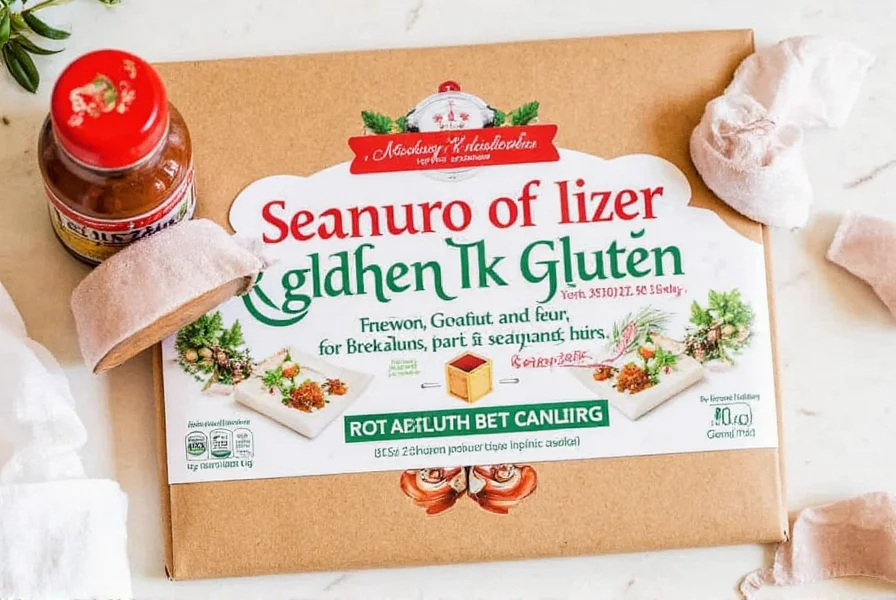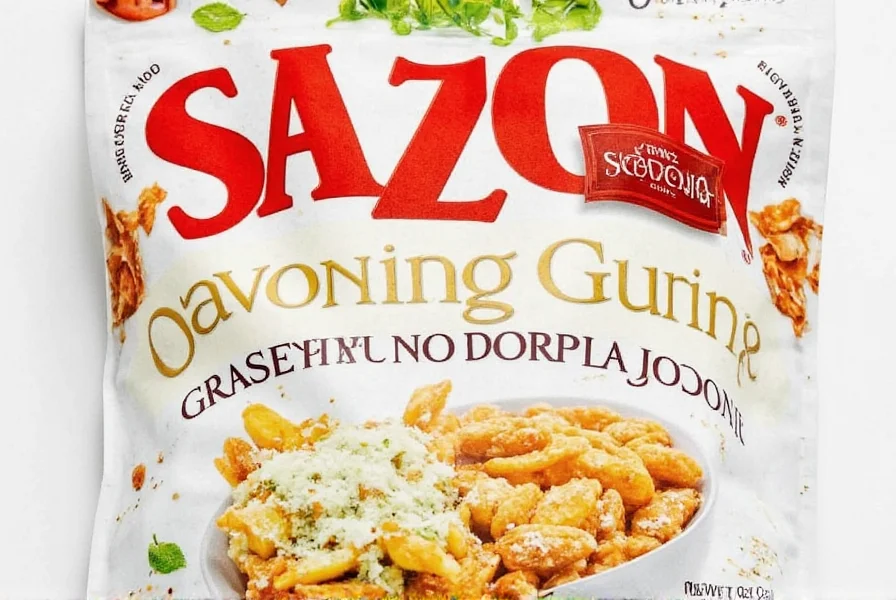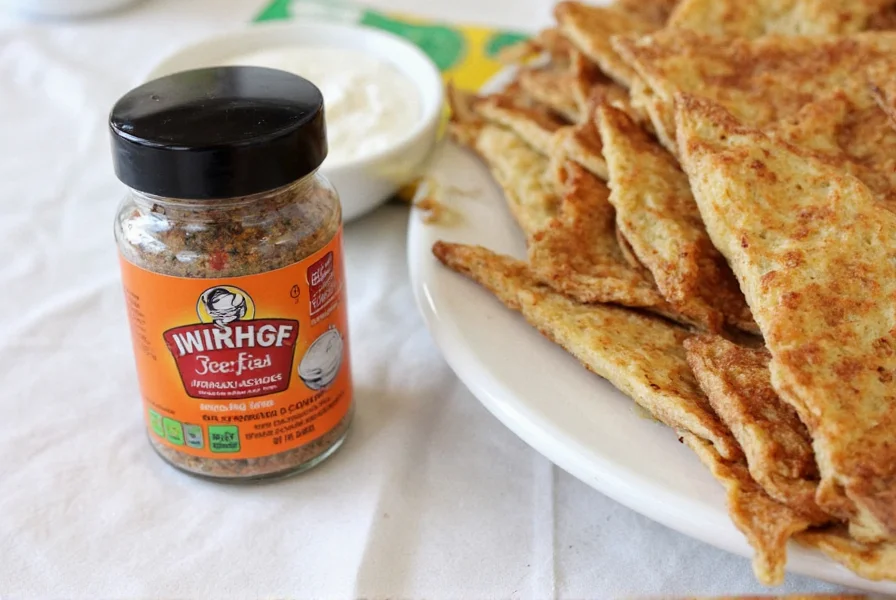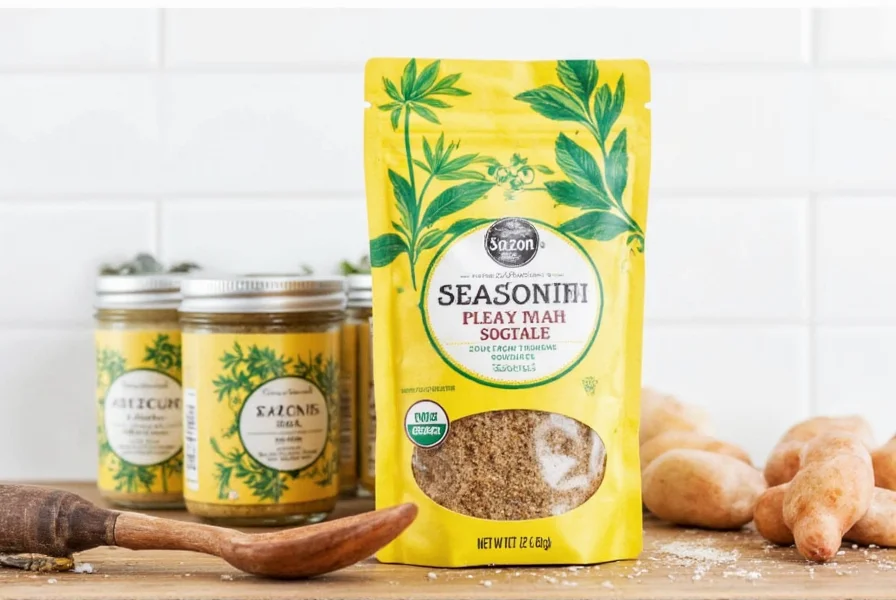Is Sazon Gluten Free? Quick Answer & Key Facts
Sazon is not always gluten-free. Many commercial brands contain wheat starch or other gluten ingredients. Certified gluten-free options exist and meet FDA standards of less than 20ppm gluten, making them safe for celiac disease and gluten sensitivity. Always check labels for "gluten-free" certification and ingredient lists.
Sazon (pronounced "sah-SON") is a popular spice blend in Latin American and Caribbean cuisine, known for its vibrant color and rich flavor. But for those following a gluten-free diet, it's crucial to know which brands are safe. This guide explains exactly what to look for, compares certified gluten-free sazon brands, and provides essential tips to avoid hidden gluten.
What Exactly Is Sazon?
Sazon (pronounced "sah-SON") is more than just a seasoning; it's a cultural icon. This popular spice mix is used throughout Latin America and the Caribbean, especially in Puerto Rican and Dominican cooking. It brings together a unique combination of flavors that elevate everything from rice to meats and stews.

Typically, sazon includes:
- Cumin
- Coriander
- Garlic powder
- Annatto (for that signature orange-red hue)
- Some versions include oregano, paprika, or citrus zest
The exact formula varies by region and brand, but the core purpose remains the same: to enhance flavor and add visual appeal to food. Because of its versatility and bold taste, sazon is often called the "magic dust" of Latino cuisine.
The Hidden Dangers: Where Gluten Lurks in Spices
When most people think about gluten, they imagine bread, pasta, or beer—not spice bottles. But many commercial seasonings include additives to improve shelf life, texture, or flowability. These additives can sometimes contain gluten, making them dangerous for people with celiac disease or non-celiac gluten sensitivity.
Common gluten-containing additives in spices include:
- Modified food starch (if derived from wheat)
- Maltodextrin (often from wheat unless specified otherwise)
- Dextrin (again, may come from wheat)
- Bread crumbs or flour (used in some spice blends for texture)
This is why reading labels becomes crucial when trying to maintain a strict gluten-free diet. Just because something looks like harmless seasoning doesn't mean it won't affect your digestion or health negatively.
Is Sazon Gluten Free? The Truth Revealed
Now, onto the big question: is sazon gluten free?

The short answer is: it depends. Traditional homemade sazon recipes using pure spices are naturally gluten-free. However, most store-bought sazon mixes contain gluten due to added preservatives, anti-caking agents, or bulking agents like wheat starch.
The U.S. Food and Drug Administration (FDA) requires products labeled "gluten-free" to contain less than 20 parts per million (ppm) of gluten. Always look for this certification or verify ingredients directly.
Sazon Brands Compared: Which Ones Are Truly Gluten Free?
Let's break down some of the most popular sazon brands and see how they stack up in terms of gluten content. Here's a handy comparison table:
| Brand | Gluten-Free? | Key Ingredients | Notable Features |
|---|---|---|---|
| Goya Sazon | No (contains wheat) | Coriander, turmeric, garlic, wheat starch | Most widely available, classic flavor |
| Badia Sazon | No (contains wheat) | Spices, salt, wheat starch | Consistent quality, affordable |
| El Rey Sazon | Yes | Spices, annatto, salt | 100% gluten-free certified |
| Maggi Sazon | No (contains gluten) | Monosodium glutamate, spices, wheat | Flavor-enhanced, not suitable for gluten-free diets |
| Simply Organic Sazon | Yes | Organic spices, annatto, sea salt | Organic, non-GMO, gluten-free certified |
If you want to play it safe and avoid cross-contamination risks, opt for certified gluten-free sazon blends or make your own at home.
Buying Guide: How to Choose the Right Gluten-Free Sazon
Whether you're shopping at a local grocery store or browsing online, here's what to look for when choosing a gluten-free sazon:

- Label Verification: Look for the words "Gluten Free Certified" or "GF" on the packaging.
- Ingredient Inspection: Check for any mention of wheat, barley, rye, or unspecified starches.
- Brand Reputation: Stick with trusted brands known for transparency, such as El Rey or Simply Organic.
- Packaging Safety: Avoid bulk bins where cross-contamination can occur. Always choose sealed containers.
Top Picks for Gluten-Free Sazon
Here are our top-rated gluten-free sazon picks based on quality, availability, and flavor profile:
| Product | Best For | Features | Price Range |
|---|---|---|---|
| El Rey Gluten-Free Sazon | Everyday cooking | Certified gluten-free, no MSG, natural coloring | $6–$8 |
| Simply Organic Sazon | Health-conscious cooks | Organic, non-GMO, vegan-friendly | $9–$12 |
| La Flor Gluten-Free Sazon | Authentic Latin flavor | Traditional blend without gluten additives | $7–$10 |
Pro Tips for Using Sazon in Gluten-Free Cooking
Once you've found your perfect gluten-free sazon blend, it's time to put it to work! Here are five tips to help you maximize flavor while keeping things gluten-free:
- Season Generously: Sazon is potent but subtle. Don't shy away from using enough to truly flavor your dish.
- Pair With Citrus: Lemon or lime juice enhances the earthy notes of sazon beautifully.
- Rub on Proteins: Use it as a dry rub for chicken, pork, or shrimp before grilling or roasting.
- Mix Into Grains: Stir a pinch into cooked rice, quinoa, or millet for instant Latin flair.
- Create a Custom Blend: If you're adventurous, make your own gluten-free sazon mix using pure spices and annatto oil.
Conclusion: Season Smart, Eat Safe!
So, is sazon gluten free? Now you know the real answer: it depends on the brand and formulation. While traditional sazon recipes are gluten-free, many commercial versions contain gluten due to additives or cross-contamination.

Your safest bet is to either go with certified gluten-free brands like El Rey or Simply Organic, or take matters into your own hands by crafting your own homemade version.
Spice should bring joy, not worry. Armed with the right knowledge, you can enjoy the vibrant flavors of sazon without compromising your dietary needs. So go ahead—season boldly, eat safely, and savor every bite.
Frequently Asked Questions About Gluten-Free Sazon
Is all Sazon gluten-free?
No, not all Sazon is gluten-free. While traditional homemade Sazon recipes are naturally gluten-free, many commercial brands add wheat starch or other gluten-containing ingredients as anti-caking agents or fillers. Always check labels carefully or choose certified gluten-free products.
What Sazon brands are gluten-free?
Based on ingredient verification from manufacturer websites and FDA standards, El Rey Sazon and Simply Organic Sazon are certified gluten-free options. Other brands like Goya Sazon, Badia Sazon, and Maggi Sazon contain wheat and are not safe for gluten-free diets. La Flor also offers a gluten-free version worth trying.
How can I tell if my Sazon is gluten-free?
Look for a "gluten-free" certification label from recognized organizations like GFCO or NSF. Carefully read the ingredients list for any mention of wheat, barley, rye, or unspecified starches. If ingredients list "wheat starch," "modified food starch (wheat)," or "maltodextrin (wheat)," the product contains gluten. When in doubt, contact the manufacturer directly for clarification.
Does Goya Sazon have gluten?
Yes, Goya Sazon contains wheat starch as an ingredient, making it not gluten-free. The ingredient list typically includes "wheat starch" among other components. If you have celiac disease or gluten sensitivity, you should avoid Goya Sazon.
Can I make my own gluten-free Sazon at home?
Absolutely! Making your own Sazon is the safest option if you need to maintain a strict gluten-free diet. Simply combine annatto seeds (or annatto oil), cumin, coriander, garlic powder, and salt. For best results, use a 2:1:1 ratio of annatto to cumin to coriander, plus garlic powder and salt to taste.
Is Sazon seasoning safe for celiac disease?
Only certified gluten-free Sazon is safe for people with celiac disease. Regular Sazon often contains wheat-based ingredients that can trigger an autoimmune response. Certified products must meet FDA standards of less than 20ppm gluten, but always verify certification logos for reliability.
What should I look for on labels to ensure Sazon is gluten-free?
Look for "gluten-free" certification logos from recognized organizations, check for wheat, barley, or rye in the ingredients list, and watch for terms like "wheat starch," "maltodextrin (wheat)," or "modified food starch (wheat)." Avoid products with "spices" listed without specificity, as this could hide gluten-containing ingredients. When shopping, choose products with clear labeling and transparent ingredient sourcing.











 浙公网安备
33010002000092号
浙公网安备
33010002000092号 浙B2-20120091-4
浙B2-20120091-4